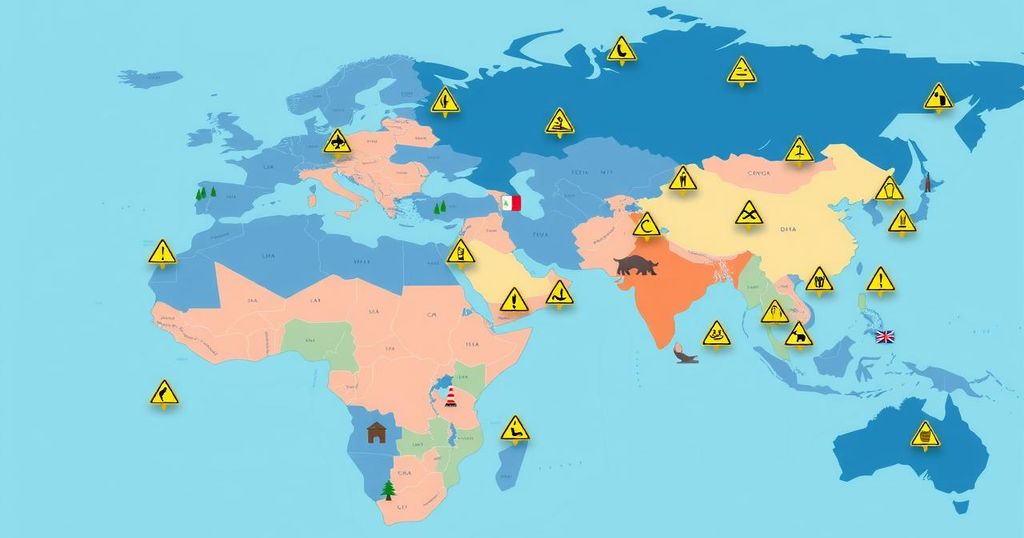Australia’s Do Not Travel Warnings: Implications for Global Tourism Dynamics

Australia has issued a Do Not Travel warning for ten countries, including Russia, North Korea, Iran, and Syria, due to severe safety concerns such as armed conflict and terrorism. These warnings halt tourism activities, suspend international travel, invalidate insurance, and hamper economic recovery dependent on tourism. This trend demonstrates how geopolitical factors increasingly influence global travel dynamics.
Australia has issued a Do Not Travel warning for ten countries: Russia, North Korea, Venezuela, Haiti, Iran, Myanmar, Sudan, Syria, Ukraine, and Libya. These warnings stem from escalating threats such as armed conflict, terrorism, civil unrest, and arbitrary detention, effectively halting any tourism activity, leading to a suspension of international flights and tours, invalidating travel insurance, and stalling economic recovery reliant on foreign visitors. This situation highlights how geopolitical crises are reshaping the global travel landscape.
The Australian Department of Foreign Affairs and Trade (DFAT) has emphasized severe safety risks as the basis for the travel advisories. Such warnings not only reflect security concerns for travelers but also indicate a significant setback for potential tourism recovery in these regions. The cumulative effect could lead to a collapse in travel to entire areas reliant on tourism.
The Australian government has urged its citizens to leave Russia immediately due to risks of arbitrary detention, increasing hostility towards foreigners, and the presence of active military zones. Consequently, tourism has drastically declined in Russia, where any foreign presence now raises scrutiny or risk.
North Korea remains completely isolated, with borders closed and all tours suspended indefinitely. Previously heavily state-controlled, tourism in North Korea has nearly disappeared, showing no signs of returning.
In Venezuela, high levels of violent crime, shortages of essentials, and the risk of arbitrary arrests contribute to its instability. As demonstrations often erupt violently, tourism infrastructure remains strained, rendering travel unsafe.
Haiti is currently under a State of Emergency, with rampant gang violence severely disrupting transport and access to airports. Major airlines have suspended flights, and violent crime, including kidnappings, poses considerable threats, effectively freezing tourism.
Iran’s tourism has diminished significantly as tensions have escalated with threats of military strikes and unpredictable security conditions. The risk of arbitrary detention adds to the dangers for travelers, making tourism in the region perilous.
Myanmar continues to be perilous due to ongoing armed conflict and civil unrest, with tourism severely impacted since the military coup in 2021. The situation remains volatile, advising against travel.
In Sudan, the continuation of violence prompts immediate departure for Australians amidst a troubling commercial departure landscape. The travel outlook is bleak, as tourism is nonexistent due to civil conflict.
Syria is classified as one of the world’s most dangerous travel locations, with high civilian casualties and active terrorist groups. The travel infrastructure is heavily restricted, leading to a complete discouragement of tourism.
Ukraine’s ongoing war has transformed the country into a high-risk area, with heavy fighting and dangers from missile attacks and landmines. Foreigners face life-threatening risks, and all tourism has ceased completely.
In Libya, the landscape remains disrupted by terrorism and armed conflict. Australians are advised to leave if possible, with consular assistance limited. The tourism sector remains entirely shuttered, despite Libya’s historical significance.
These ten countries under Australia’s Do Not Travel status symbolize a complete halt to tourism. This development reflects a growing global trend where geopolitical instability directly impacts international tourism. Travelers and tour providers are compelled to reconsider destinations and the associated risks, leading to increased challenges for tourism’s recovery in these regions.
In conclusion, Australia’s Do Not Travel warnings for Russia, North Korea, Venezuela, Haiti, Iran, Myanmar, Sudan, Syria, Ukraine, and Libya underscore the adverse impact of geopolitical instability on global tourism. The total halt of tourism in these areas reveals the fragility of the tourism industry in the face of conflict and unrest. With safety concerns skyrocketing, the prospect for safe and responsible tourism in these regions appears unreachable, leaving travelers and local economies in uncertainty.
Original Source: www.travelandtourworld.com






